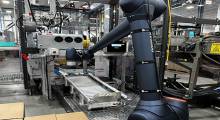Market research and consulting firm IDC has released its annual list of manufacturing supply chain predictions, which highlight the growing urgency to innovate.
The IDC FutureScape provides IDC Manufacturing Insights’ top 10 predictions for global supply chains for 2016. The document reflects ongoing conversations between IDC analysts and technology vendors, consultants, and IT buyers about what the coming years will hold for companies in the manufacturing industry.
Among them is a prediction that by the end of 2016 one-third of all manufacturers will be actively integrating their “traditional” supply chain processes with product and network design, manufacturing, and service.
“The common thread across these predictions is change,” said Simon Ellis, vice president of global supply chain strategy for IDC Manufacturing Insights, in a recent interview. “Manufacturing businesses are undergoing enormous change, including changing consumer expectations and technological advancements. I’ve been in and around the supply chain for 30 years, and it seems like the pace and impact of change is greater than we’ve seen.”
Ellis said e-commerce networks are simply a better way of doing most things in the supply chain, organizations recognize that, and they are actively using related solutions or have immediate plans to.
“Also, frankly, it’s not that difficult to do, as compared to micro-logistics strategies where the idea is to think differently about fulfillment and logistics networks, whether that involves fewer large facilities or more small ones,” he said. “That’s not something easy or that will happen overnight. Micro-logistics might be something companies do themselves, or they might partner with UPS. It will be a complex evolution.”
When asked if the industry is generally keeping pace with investment and innovation or woefully behind, Ellis described a classic bell curve.
“If you drew a vertical line down the center, those companies to the left might be slightly ahead of the game, and to the right slightly behind,” he said. “But we can’t say that in three years the companies that pursue all 10 of these predictions will be in good shape or that anyone who hasn’t won’t be. It will be about each company making the best decisions for their supply chain. Companies need to understand the implications of these things and the impact on the supply chain and be proactive about the potentialities and not be caught by surprise.”
In random order, the IDC Top 10 Supply Chain Predictions:
● By the end of 2016, the majority of all manufacturers will be actively employing commerce networks in their supply chains to facilitate either demand, supply, or the development of new products.
● By the end of 2018, 25% of manufacturers will have implemented a micro-logistics strategy within part or all of their business to support a more distributed inventory management strategy.
● By 2018, 75% of manufacturers will coordinate enterprise-wide planning activities under the umbrella of rapid integrated business planning.
● By 2019, 50% of manufacturers will have modernized their logistics network to leverage 3D printing, robotics, and cognitive computing to support innovative postponement strategies.
● By the end of 2019, enterprise-wide improvements in resiliency and visibility will have rendered short-term forecasting moot for 50% of all consumer products manufacturers and 25% of all others.
● By the end of 2016, one-third of all manufacturers will be actively integrating their “traditional” supply chain processes with product and network design, manufacturing, and service.
● By the end of 2017, the need for visibility, scalability, and flexibility across the value chain will drive 60% of manufacturers to invest in cloud-based WMS and TMS solutions aligned to their trade partner networks.
● By 2018, 40% of manufacturers will be investing in robotics, autonomous guided vehicles (AGVs) and associated systems within their warehousing operations to drive automation into their fulfillment processes.
● By 2018, proliferation of advanced, purpose-built, analytic applications aligned to the Internet of Things (IoT) will result in 15% productivity improvements for manufacturing supply chains.
● By 2020, 50% of the operational jobs in the supply chain will have evolved into “knowledge” roles required to support new technologies like cognitive computing and modern robotics.
IDC also offered the following observations:
● Customer engagement and customer service are woven into a number of manufacturer’s priorities and are significant influencers on the supply chain.
● Supply chain modernization must support evolving market requirements, the manufacturers’ need for speed, innovation in processes, products and services, and innovative talent.
● It isn’t enough just to have technology; companies must work to create value from their investments.
● The rapid adoption of IT is changing business and engagement models.
Read the 2014 predictions to see if your company has kept pace.
The IDC FutureScape is a strategic planning tool designed exclusively for technology professionals in IT buyer organizations. This audience includes CIOs, VPs of engineering and manufacturing, IT directors, IT managers, IT architects, and IT buyers from within business lines and functions. This study identifies the factors that are most significantly driving supply chains within manufacturing.
About the Author
Follow Robotics 24/7 on Linkedin
About the Author
Follow Robotics 24/7 on Linkedin
About the Author
Follow Robotics 24/7 on Linkedin
Article topics
Email Sign Up















